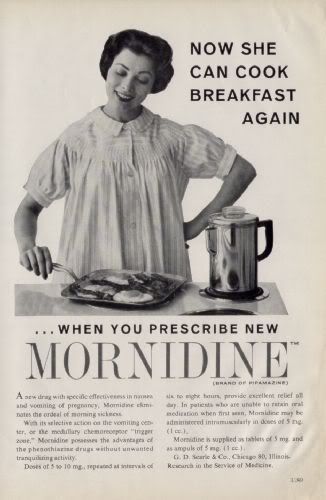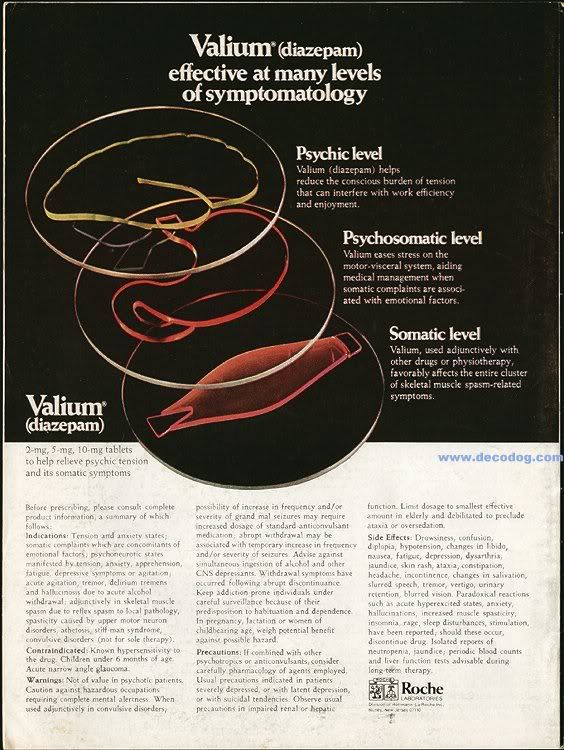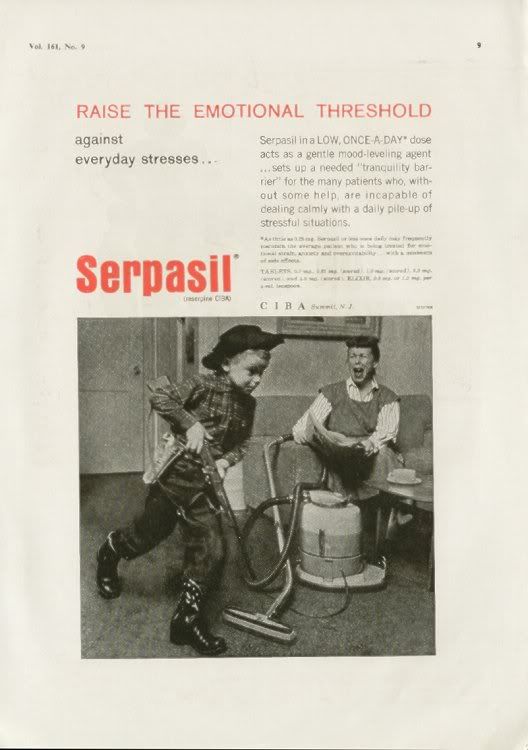Another case of undisclosed conflicts of interest by research analysts

But this time it's not stock brokers; it's doctors, medical journalism, Big Pharma and the medical services industry.
Top mental health guide questioned
By Judith Graham, Chicago Tribune staff reporter, Published April 20, 2006
Most of the experts who prepared the world's leading medical guide to mental illness had undisclosed financial relationships with drug companies that presented potential conflicts of interest, according to a new report published Thursday in the journal Psychotherapy and Psychosomatics.See, too:
The study is the first to document extensive monetary connections between drug companies, psychiatrists and other scientists responsible for the American Psychiatric Association's Diagnostic and Statistical Manual of Mental Disorders.
The DSM, as it's commonly called, defines all the mental illnesses recognized by psychiatry and outlines the criteria used to determine whether a person has one of these conditions. Medical professionals refer to it as the "bible of mental health" in the U.S. The current version, the DSM-IV, was published in 1994 and modified in 2000.
The manual is of enormous importance to pharmaceutical firms, as the Food and Drug Administration will not approve a drug to treat a mental illness unless the condition is in the DSM. Drug companies then can market approved medications to physicians and consumers."This is one of the most important medical documents we have in this country, yet the public doesn't have relevant information about the experts involved in developing and revising it," said Sheldon Krimsky, a Tufts University professor and co-author of the new paper.
His study found that 56 percent of 170 panel members responsible for overseeing the DSM-IV had some type of financial tie to the drug industry--including getting research grants from drug companies (42 percent), serving as consultants (22 percent) and participating in speakers bureaus (16 percent). These relationships weren't revealed publicly.
The risk is that financial relationships might directly or indirectly bias panel members to make decisions favorable to the drug industry. Relationships formed after the DSM-IV's publication also can be problematic in that panel members could appear to be "cashing in" on their influence, Krimsky noted.
The enormous growth in prescriptions for psychiatric drugs also raises concerns about the potential impact on consumers.
Dr. Darrel Regier, director of research at the American Psychiatric Association, said disclosure of potential conflicts of interest "wasn't the standard in the field" at the time the latest edition came out. "For the next revision," due in 2011, "we will have full disclosure," he said.
Of particular concern, Krimsky suggested, is his study's finding that 100 percent of the experts on DSM-IV panels overseeing mood disorders and schizophrenia/psychotic disorders were financially involved with the drug industry. These are the largest categories of psychiatric drugs in the world--2004 sales of $20.3 billion and $14.4 billion respectively.
"The more lucrative the drug market, the higher the percentage of experts with financial ties--that has to raise serious questions about these panels' objectivity," said David Rothman, professor of social medicine at Columbia University's College of Physicians and Surgeons.
"We have not had an opportunity to review the study, but it is important to note that the physicians and other health-care professionals who sat on expert medical advisory panels have impeccable integrity," said Ken Johnson, senior vice president for Pharmaceutical Research and Manufacturers of America.
Others think drug industry practices are challenging the integrity of science. "The very vocabulary of psychiatry is now defined at all levels by the pharmaceutical industry," said Dr. Irwin Savodnik, an assistant clinical professor of psychiatry at the University of California, Los Angeles.
According to his calculations, the original 1952 DSM manual contained 107 mental health disorders. By the fourth edition in 1994, the number had more than tripled to 365.
Case studies of Big Pharma’s sharp practice
Big Pharma: the reality
Patently wealthy, etc.



2 Comments:
Holy Smoke! This is explosive!
Woe is me! so little time, so much corruption...what's a blogger to do?
Appreciate your blog,mental health consumers are the least capable of self advocacy,my doctors made me take zyprexa for 4 years which was ineffective for my symptoms.I now have a victims support page against Eli Lilly for it's Zyprexa product causing my diabetes.--Daniel Haszard www.zyprexa-victims.com
Post a Comment
<< Home